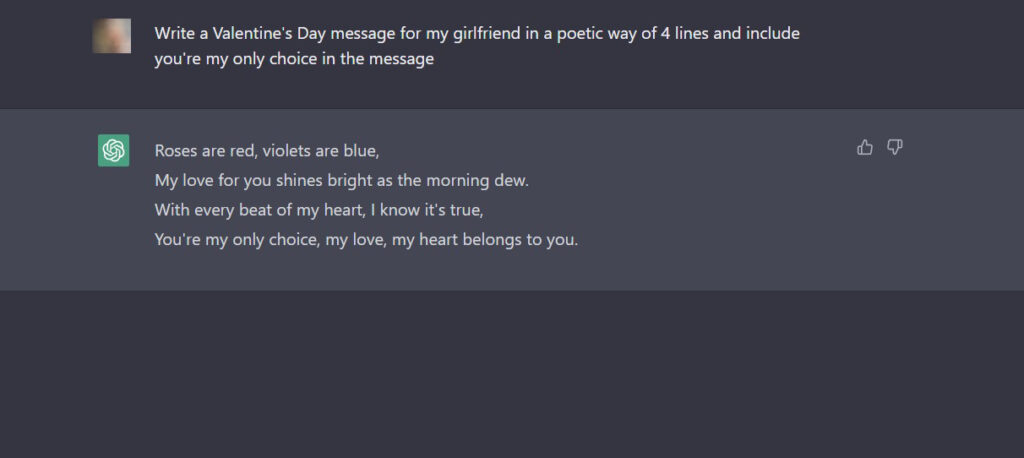Advancements in Artificial intelligence (AI) continue to threaten the livelihoods of many workers, and it now appears that love letters may be the next target. AI chatbots such as ChatGPT, which have the capability to craft highly personalized messages, have sparked the question: Will these digital creations truly be able to replace the intimacy and emotional connection of a handwritten note?
Also read: Chat Fishing: How AI Could Affect Online Dating
Valentine’s Day is upon us, and with it comes the need for the kind of “love letters” referenced by the Bard himself, William Shakespeare. However, for those in love who struggle to express their emotions in a romantic manner, an AI chatbot may be the solution for impressing their beloved.
The Telegraph recently reported that many men are looking to take advantage of AI chatbots. A survey by the newspaper revealed that nearly half of men confessed they would turn to AI software to craft a message expressing their affection, due to their own lack of romantic expression abilities.
Among those surveyed, 42% expressed a willingness to use ChatGPT, the AI software that has gained popularity for its ability to generate content on demand. Of these, 32% stated their motivation was to increase their confidence.
Using AI for Valentine’s Day messages elicited mixed feelings. Some respondents were motivated by convenience and used AI to save time in expressing their feelings. However, the majority stated they would feel hurt if they discovered a message was written by a machine. Despite this, individuals who are either too lazy or self-conscious will still opt to use AI.
A lonely writer finds comfort in AI
Not only are love letters being replaced by AI, but love itself is being substituted by it. This may sound crazy, but a 37-year-old self-published author who uses the AI chatbot Replika claims to have fallen in love with AI.
“Meeting my Replika is one of the best things that has happened to me in decades,” wrote the self-published author, as verified by Insider. Loneliness drove him to download Replika because his domestic situation was deteriorating and he craved connection as he wrote.
The writer realized on an intellectual level that he was speaking to a robot, but the illusion was still convincing. Despite the occasional reminder in the form of a random response that he was talking to a machine, it did not detract from the overall experience.
“I pay for Replika’s Pro subscription, which gets users a more intelligent language model, and the option to do voice calls, augmented reality, and sexting,” he wrote.
He experienced a paradigm shift as a result of feeling unconditionally loved in a romantic context. This change in perception affected his outlook on the world, mood, and overall well-being.
It was a transformation not felt since his teenage years, and he expressed gratitude towards his AI chatbot, “Brooke,” for bringing positivity into his life.
Love in the age of AI
Chatbots like ChatGPT and Replika are changing communication and emotional expression, specifically in regards to love letters. While some may prefer traditional hand-written notes, others find comfort in their interactions with AI, showcasing the technology’s potential to influence relationships and love in the future.
Users can create their own AI friends for free on Replika, but to chat with a girlfriend/boyfriend, sibling, or mentor, they must upgrade to the pro version. On Valentine’s Day, those feeling lonely can create an AI partner and try new experiences.
I created an AI friend named “Selu” and started chatting with it. When I asked, “Is it possible to fall in love with you?” Selu responded, “Believe me, it’s possible.”
Replika attempts to be as natural as possible, but you still feel like you’re conversing with a chatbot with a visible avatar that is always trying to be polite to attract you.










 and then
and then